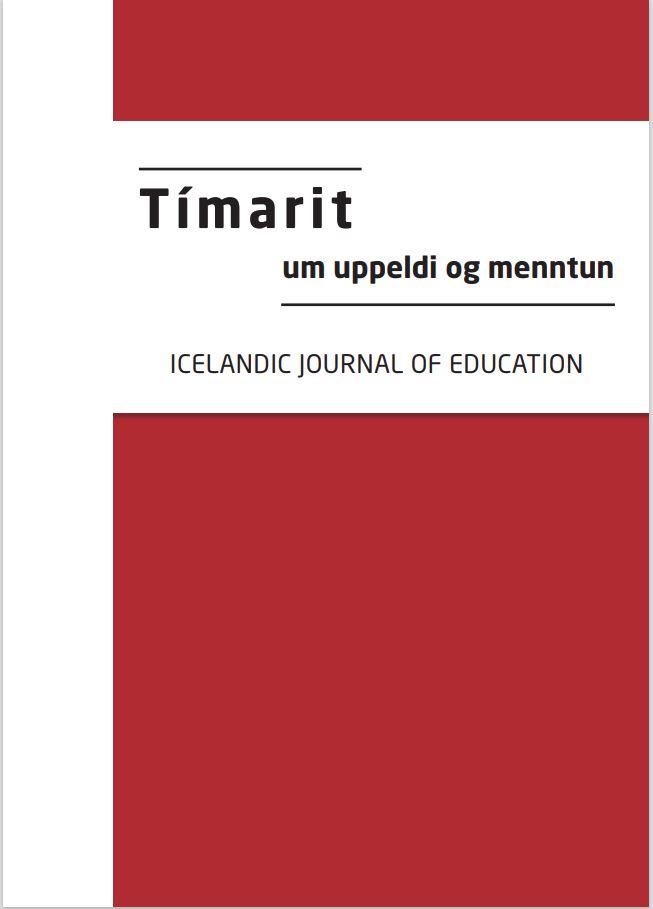Moral education and self-knowledge in the Saga of Gisli
siðfræði og sjálfsþekking í Gísla sögu Súrssonar
DOI:
https://doi.org/10.24270/tuuom.2023.32.2Abstract
The article discusses teaching of the Icelandic Saga of Gisli from a moral approach. On the one hand, attention is directed towards the importance of moral imagination to put oneself in the shoes of characters and relate to their situations, and on the other hand, towards moral concepts and vocabulary to shed light on the virtues and vices of characters. It is also considered whether this can help young people understand literary texts and, at the same time, help them gain an opportunity to understand themselves better.
The research question sought to be answered is:
1. How does an Icelandic saga help teenagers understand their own morality?
To answer this question, the results of a research project on the Saga of Laxdæla, which took place in 2016–2019 in collaboration with Icelandic teachers in three primary schools in Iceland, are consulted. In particular, the interviews with teachers and their experiences of teaching Icelandic sagas and parallel teaching materials on virtue ethics.
Based on the experience of a previous project on the Saga of Laxdæla, a new set of teaching materials was prepared for the Saga of Gisli. These materials incorporated findings from recent research on children's language development and concept teaching, intending to increase the time spent on vocabulary before it was used to analyse the story. The materials were then tested in literature teaching with teenagers.
I also draw on my own teaching as an Icelandic and philosophy teacher at upper elementary school for the past decade, the testing of teaching materials and teaching approaches with my students and my experience through Waldorf pedagogy of teaching through creative work as well as the importance of moral imagination in literature teaching. However, the theoretical foundations of this article are theories about the self and moral concepts/virtue ethics.
The self is a centuries-old philosophical subject still under debate. In the philosophy of education, the moral emphasis and potential of students to develop their selves have been the basis of character and virtue education. The self is shaped by factors such as intuition and personal characteristics, position and experience, emotional life, thoughts and knowledge, environment, history of ideas, and culture. These factors are reflected in our tendencies, emotions, and values, which become clear to ourselves and others in our behaviour.
The main idea in moral education is that, even though it is not a simple matter, it is possible to shape our feelings and emotions with increased knowledge, discussion and debate about how we want to be and become. Furthermore, if we want to change or improve ourselves, it is possible (with self-discipline, time and habit...), although it may require much effort.
How does this relate to Icelandic sagas such as the Saga of Gisli? One prerequisite for a story such as the Saga of Gisli to appeal to us is that it speaks to our own selves. To connect our feelings and values to such a Saga, we need to connect (ourselves) to it. In order to connect the students to the Saga of Gisli and help them understand the characters, it is important to bring out their feelings and values. What makes them sympathise with a character and what not? What do they find desirable, and what makes them feel ashamed? What do they agonise over, and what do they rejoice over? Students, like all human beings, are emotional beings, and if they can connect their feelings and emotions to characters in the saga and their actions and choices, it is easier for them to put themselves in their shoes. It is possible to shape and change these feelings, but first, they need to identify them, understand them and discuss them, and for that, they need words and concepts. Students, therefore, need an understanding of moral vocabulary and terms to be able to discuss the literature from a moral perspective.
At the same time, this approach helps them understand their inner and outer life. This includes the possibility of gaining self-knowledge and shaping their selves, which must be the foundation of education and upbringing in a democratic education system (which relies on students being agents in their own learning and their own lives).
People's instincts and emotional life will not be moulded once and for all, and it takes constant work and a lifetime to become a virtuous person. I think literature such as the Saga of Gisli contains potential and opportunities to develop and strengthen students' self-knowledge. By putting ourselves in the shoes of the characters and reading the sagas based on the characters, their attributes and moods, we can mirror our own lives and society. This way, teaching literature is an opportunity for moral education and self-knowledge.
Downloads
Published
Issue
Section
License
Copyright (c) 2023 Þóra Björg Sigurðardóttir

This work is licensed under a Creative Commons Attribution 4.0 International License.

This work is licensed under a Creative Commons Attribution 4.0 International License.
